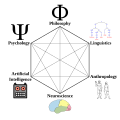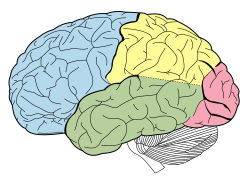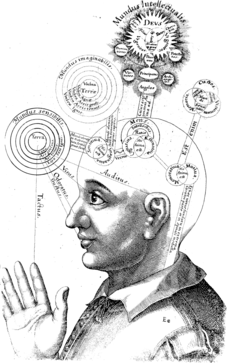Cognitive hierarchy theory (CHT) is a behavioral model originating in behavioral economics and game theory that attempts to describe human thought processes...
12 KB (1,785 words) - 11:33, 18 November 2024
Maslow proposed his hierarchy of needs in his 1943 paper "A Theory of Human Motivation" in the journal Psychological Review. The theory is a classification...
46 KB (5,388 words) - 18:09, 11 July 2025
equilibrium in games without communication. The cognitive hierarchy (CH) theory is a derivation of level-n theory. A level-n player from the CH model would...
12 KB (1,698 words) - 17:36, 13 June 2025
Social cognitive theory (SCT), used in psychology, education, and communication, holds that portions of an individual's knowledge acquisition can be directly...
57 KB (7,055 words) - 10:23, 12 July 2025
Modern Group That Predicted the Destruction of the World (1956) and A Theory of Cognitive Dissonance (1957), Leon Festinger proposed that human beings strive...
129 KB (15,606 words) - 07:47, 3 July 2025
Piaget's theory of cognitive development, or his genetic epistemology, is a comprehensive theory about the nature and development of human intelligence...
88 KB (10,537 words) - 18:54, 22 May 2025
A cognitive architecture is both a theory about the structure of the human mind and a computational instantiation of such a theory used in the fields of...
18 KB (1,251 words) - 18:41, 1 July 2025
desires that influence their behavior. Content theories contrast with process theories, which examine the cognitive, emotional, and decision-making processes...
111 KB (14,413 words) - 21:01, 13 July 2025
Cognitive psychology is the scientific study of human mental processes such as attention, language use, memory, perception, problem solving, creativity...
47 KB (5,564 words) - 00:45, 13 July 2025
Neo-Piagetian theories of cognitive development criticize and build upon Jean Piaget's theory of cognitive development. The neo-Piagetian theories aim to correct...
75 KB (9,896 words) - 02:13, 27 June 2025
The Cattell–Horn–Carroll theory (commonly abbreviated to CHC), is a psychological theory on the structure of human cognitive abilities. Based on the work...
22 KB (2,586 words) - 22:47, 7 June 2025
chimpanzees for more complex representations and hierarchical organization used in language. The theory was first brought forth by Japanese primatologist...
7 KB (890 words) - 22:42, 18 March 2025
that reliably produce reasoning errors. Coherent, comprehensive theories of cognitive bias mitigation are lacking. This article describes debiasing tools...
48 KB (6,387 words) - 06:08, 17 June 2025
Cognitive science is the interdisciplinary, scientific study of the mind and its processes. It examines the nature, the tasks, and the functions of cognition...
74 KB (8,639 words) - 22:29, 11 July 2025
of a Theory of Human Problem Solving". Ulric Neisser's 1967 book Cognitive Psychology was also a landmark contribution. Prior to the cognitive revolution...
30 KB (3,735 words) - 20:41, 25 May 2025
The model of hierarchical complexity (MHC) is a framework for scoring how complex a behavior is, such as verbal reasoning or other cognitive tasks. It quantifies...
44 KB (4,741 words) - 21:28, 8 October 2024
neuroscience, cognitive psychology, physiological psychology and affective neuroscience. Cognitive neuroscience relies upon theories in cognitive science coupled...
58 KB (6,631 words) - 12:30, 12 June 2025
investigates factors affecting theory of mind in humans, such as whether drug and alcohol consumption, language development, cognitive delays, age, and culture...
136 KB (17,082 words) - 22:06, 29 June 2025
distance. The concept of visual hierarchy is based in Gestalt psychological theory, an early 20th-century German theory that proposes that the human brain...
10 KB (1,134 words) - 12:39, 12 February 2025
Cognitive biases are systematic patterns of deviation from norm and/or rationality in judgment. They are often studied in psychology, sociology and behavioral...
110 KB (10,226 words) - 16:47, 15 July 2025
Bloom's taxonomy (section Cognitive (knowledge-based))
three broad domains: cognitive (knowledge-based), affective (emotion-based), and psychomotor (action-based), each with a hierarchy of skills and abilities...
22 KB (2,614 words) - 12:55, 12 January 2025
distributed uniformly over the range [0, 100]. In accordance with cognitive hierarchy theory, level 1 players select the best responses to level 0 choices...
16 KB (1,986 words) - 09:10, 24 June 2025
DIKW pyramid (redirect from Hierarchy of knowledge)
variously as the knowledge pyramid, knowledge hierarchy, information hierarchy,: 163 DIKW hierarchy, wisdom hierarchy, data pyramid, and information pyramid...
49 KB (5,411 words) - 21:24, 25 May 2025
Prototype theory is a theory of categorization in cognitive science, particularly in psychology and cognitive linguistics, in which there is a graded...
31 KB (4,217 words) - 21:11, 22 June 2025
G factor (psychometrics) (redirect from General cognitive ability)
typically represent cognitive abilities as a three-level hierarchy, where there are many narrow factors at the bottom of the hierarchy, a handful of broad...
121 KB (18,337 words) - 16:46, 17 June 2025
Syntax (redirect from Syntactic hierarchy)
Central concerns of syntax include word order, grammatical relations, hierarchical sentence structure (constituency), agreement, the nature of crosslinguistic...
26 KB (2,856 words) - 04:48, 10 July 2025
Social Foundations of Thought and Action (redirect from Social Foundations of Thought and Action: A Social Cognitive Theory)
Social Cognitive Theory is a landmark work in psychology published in 1986 by Albert Bandura. The book expands Bandura's initial social learning theory into...
19 KB (2,124 words) - 07:44, 28 August 2024
The three-stratum theory is a theory of cognitive ability proposed by the American psychologist John Carroll in 1993. It is based on a factor-analytic...
6 KB (688 words) - 01:59, 18 November 2022
Cognition (redirect from Cognitive process)
in the 1990s as the development of cognitive science presented theories that highlighted the necessity of cognitive action as embodied, extended, and producing...
55 KB (6,205 words) - 07:22, 15 July 2025
human mind often seeks to avoid spending cognitive effort. The cognitive miser theory is an umbrella theory of cognition that brings together previous...
34 KB (4,037 words) - 09:56, 14 February 2025









